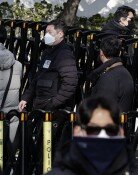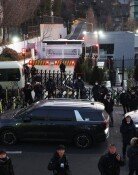[Opinion] Strong Labor Movement Crisis
[Opinion] Strong Labor Movement Crisis
Posted March. 12, 2002 09:55,
120,000 U.S. labors lost their jobs for one month after 9.11 attacks.
22,000 crew members were chucked out of jobs, as flight passengers reduced rapidly.
Boeing Company plans to deduct 30,000 workers by year end in succession with firing 2,900 persons recently due to decreasing order of private flights.
If income decreases, U.S. companies first, dismiss workers.
There is even statistics that 3 families among 4 U.S families experienced dismissal.
Although big- scale dismissal is carried out the following the will of management group, labor unions are helpless.
The U.S ranks the lowest level among Organization for Economic Cooperation and Development (OECD) nations as it has 12 percent of organizing rate of labor unions, therefore, it causes concern if labor unions are dead.
Despite AFL-CEO support of 30 percent for whole budget to raise the rate of organizing labor unions, it gets defeated at the vote for foundation of labor unions in big-scale companies.
Why labor movement is depressed in U.S.?
Above all else, labors have become specialized as employment style diversified like part-time jobs by industrialized service system.
As payment is paid according to the capacity and achievement, income gap in labors has widened and it has became inconvenient to negotiate uniformly and collectively through negotiation between labor and company.
New generation workers who get solvency are indifferent to demonstration to raise up comprehensive labor`s benefit, as they have strong inclination towards individualism.
Even labors of one company are not able to unite to say nothing of combination of national labors.
Korea, however joining rate in labors unions is like the U.S. but its labor movement is quite severe, like no other in the world.
Whenever spring fight starts they occupy city roads by street demonstration every weekend and steel pipes, fire bottles, stone often appear.
It displays its power to paralyze social functions almost by not only stopping factories in which labor and company dispute occurred, but also who have nothing to do with it take part in joint strike.
Labor movement is heritage of past dominant regime related to democratic movement, however, consciousness that takes it for granted to infringe law and to confront public power still remains.
Iron-fisted rule era of former Presidents like Park Jong-Hee, Jeon Doo Hwan limited labor movement entirely to abide by national security.
Relationship between labor and company, where labor unions were established was not equal, too.
Dismissed labor movement used to be arrested and blocked from getting jobs in other enterprises as blacklist used to get circulated.
Likewise since labor movement was pressurized, it was difficult to crictize it, although it is somehow violent labor movement violating law.
Legal space where labor movement can be carried out has expanded highly in current government.
Korea Confederation Trade Union (KCTU) and Korea Teachers Union (KTU) became legalized and official labor union will also be admitted soon.
Working conditions of 12 percent labors in unions, getting power in labor unions, has improved remarkably.
According to labor ministry, average annual salary of labors in KEIPU who are under strike is above 30 million won.
In comparison to this, 88 percent non-union labors receive not even half of it and should bear worse working conditions.
If enterprises recruit regular staff at first, it is difficult to dismiss them, therefore, they are reluctant to new recruitment and if needed, they use head hunter, out sourcing, contract jobs or foreign labor.
The more labor unions get fruits by strong power, the less new recruitment decreases and non labor union rate rises, ironically.
Enterprises avoid new investment in country where strong labor unions are; thereby new employment scale has shrunk.
U.S. and British economy that has big relaxation in labor market is going relatively smooth.
Europe countries where controls regarding dismissal are slow in growth and expenditures are high, therefore unemployment is high due to big enterprises avoiding recruitment
Labor unions of public industry that went on strike recently, resist that public enterprises should not be privatized, however, to reduce people`s tax burden, privatization is the most assertive method for removing non-efficient public industry.
The above has already been concluded by investigating not only developed countries but also old state socialism and domestic.
Doosan heavy industry (Old, Hankook Heavy Industry), which was representative public enterprise withdrew staff of bureaucratic origin and army generals, therefore, 38 staff was deduced from 70.
It closed constructing cement factories, producing steel bridges and iron manufacturing department that had not made profit even once since inauguration.
Thereby, for one year since privatization, enterprises that used to make deficit made pure profit around 25 billion won by deducting 1,160 labors who were 15 percent of total manpower.
Korean Trade Union (FKTU) and Korea Confederation of Trade Union (KCTU) are heating up dispute for stopping privatization which is against economic theory, in the process that compete for securing labor unions.
Labor unions in public industry should have self-inspection if current dispute for stopping privatization is compatible to world tide and economic reality.
Understanding economy reality should be raised up in order to go through crisis of labor unions that is occurring world wide.
Hwang Ho-Taek (Editorial writer).







